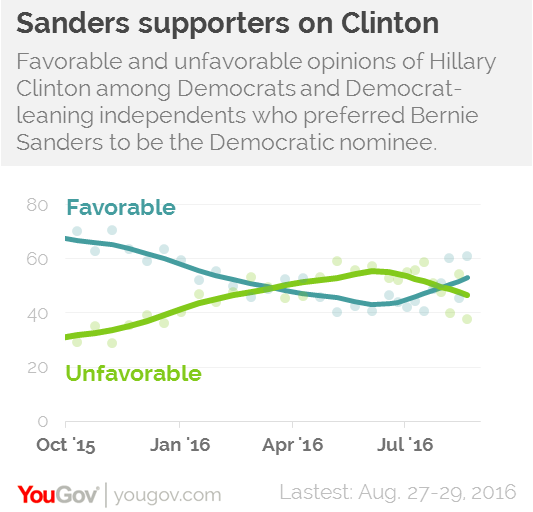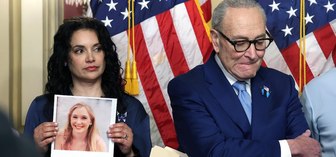Many Democrats and Democrat-leaning independents who preferred Bernie Sanders in the primary still have gripes with the nominee
Bernie Sanders is hitting the campaign trail for Hillary Clinton on Labor Day – his first solo trip since the Vermont senator endorsed his former rival for the Democratic nomination in July.
The trip could be useful for Clinton, as data shows she continues to struggle with Democratic voters who preferred Sanders in the primary, though opinions have become more positive in August.
 According to data from the YouGov/Economist Poll, Clinton’s favorability rating among Democrats and Democrat-leaning independents who preferred Sanders over Clinton fell to a low-point in late May and early June as it became clearer Clinton would be the nominee. (This is a slightly different group than the “Democratic primary voters” YouGov has also tracked, a group which includes non-Democratic leaning voters). At one point in May, only 40% in this group had a favorable opinion of Clinton and 59% were unfavorable.
According to data from the YouGov/Economist Poll, Clinton’s favorability rating among Democrats and Democrat-leaning independents who preferred Sanders over Clinton fell to a low-point in late May and early June as it became clearer Clinton would be the nominee. (This is a slightly different group than the “Democratic primary voters” YouGov has also tracked, a group which includes non-Democratic leaning voters). At one point in May, only 40% in this group had a favorable opinion of Clinton and 59% were unfavorable.
In August the number has been more volatile, but smoothing the trend suggests an uptick since the Democratic National Convention. Clinton hasn’t received a favorable rating of less than 46% since mid-July among Bernie Sanders supporters, and her unfavorable rating has floated down to the low 50s and high 40s.
Clinton’s popularity among this group is below where it was in the fall of 2015, but notably the group itself – Sanders supporters – has likely experienced significant churn over the same period. In October and November, his support among Democrats and leaners ranged from 23% to 33% (that number would rise to more than 40% in 2016). In other words, it may be that the Sanders campaign eventually attracted voters already unhappy with Clinton as he became better known as the main alternative.
Favorability isn’t everything, however, and many Sanders supporters may just need to be convinced to hold their noses and vote for a candidate they don’t like. In voting intention, 60% of Sanders-supporting voters back Clinton over Trump – which is more than the 47% who have a favorable opinion of Clinton in the same poll. But Donald Trump gets 9%, Libertarian Party candidate Gary Johnson gets 6% and the Green Party’s Jill Stein gets 11% with this same group; another 14% are undecided or don't plan on voting. If Clinton could even get to 80% with these voters, her support would have been at 45% rather than 42% overall in the poll (Trump was five points behind at 37%) – a more comfortable place to be in a volatile four-way race.
During the primary, Sanders criticized Clinton for accepting donations from "special interests" and called on the former secretary of state to release the transcripts of speeches she gave to Wall Street exectutives. Some of these arguments may continue to trouble certain Sanders supporters. While they see Clinton as capable (78%) and qualified (80%), 52% also describe Clinton as “corrupt” and 59% says she is dishonest. By 40% to 20% this group tends to say Clinton personally profited from the Clinton Foundation, compared to a 34% to 24% split against this view among Democrats overall.










